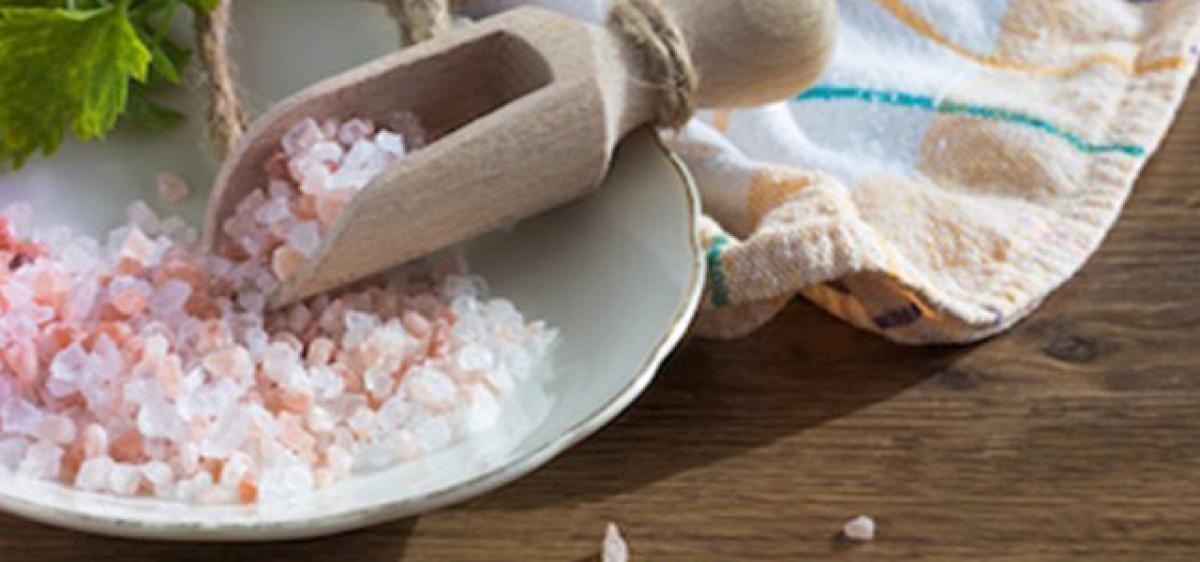Live
- Congress Candidate Kavuri Lavanya Criticizes Jagan and Babu, Calls for Change in Andhra Pradesh
- Telugu Desam Party Gains Support as Mudhiraj Community Leaders Join
- Pawan Kalyan Leads Rally in Vijayawada, TDP MP Candidate Kesineni Sivanath Welcomes Him
- Tata Motors rolls out ACE EV 1000 vehicle
- Maruti to steer entry-level car biz in speed lane
- Savings rate shrinks over rising loans
- iQoo to launch Z9x on May 16
- Clove Dental reaches 500 clinics milestone
- SBI hiring 12,000 people: Chairman
- Uncertainty ahead of poll results hits bourses
Just In

Salt contains the elements sodium and chloride. Our body needs a very small element of sodium to conduct nerve impulses, contract and relax muscles and to maintain a proper balance of water and minerals.
Salt contains the elements sodium and chloride. Our body needs a very small element of sodium to conduct nerve impulses, contract and relax muscles and to maintain a proper balance of water and minerals.
Did you know that one’s daily intake of salt should be 1500 – 2,300 milligrams, which is equivalent to three quarters to one teaspoon per day? In nature salt is found in abundance in the oceans and far less abundantly on land.
Everyone is aware that too much sodium in our diet can lead to health issues, and yet most of us do exceed the one teaspoon a day limit. Most doctors feel that excess salt can lead to high blood pressure.
A high sodium diet puts added stress on your heart as more water is needed to carry it, thereby increasing the volume of blood your heart pumps out every second.
We all need some salt. Animals in nature go to salt licks. But now many of us are getting too much of it. Salt is habit forming just like sugar.
Salt brings out the taste in food and when we are used to more, our food doesn’t taste good without it. But when we reduce it, we need less. Some vegetables like celery and leafy greens are naturally high in salt too.
How to reduce your daily salt intake…
Get off packaged and processed foods
Since salt is both addictive and a natural preservative, most packaged and frozen foods contain salt, along with sugar, preservatives, additives and more. Best would be to make your own snacks at home.
Reduce eating out
Most restaurants use a lot of packaged foods in their cooking. The tomato sauces, soup stocks, soy sauces, cheeses, ketchups, mayonnaise etc are all brought ready-made
Opt for organic sea-salt or rock salt
Not that the sodium levels are less, however you will skip the damage done due to refining and the chemicals which come from additives.
Have more fresh fruits and vegetables
These contain potassium which help counter the effects of sodium
Taste your food after it is cooked without salt
Use fresh lemon juice or freshly ground black pepper instead of salt for flavouring
Use herbs and spices to flavour your meals
Rosemary, sage, thyme, oregano, allspice, basil and more!
Avoid adding salt in boiling water for rice, pasta or vegetables
Hang in there!
It takes about 6 to 8 weeks to get into the habit of having food with less salt. But after you have crossed this, then you won’t have any issue as you will start finding even the basic potato chips too salty!

© 2024 Hyderabad Media House Limited/The Hans India. All rights reserved. Powered by hocalwire.com







